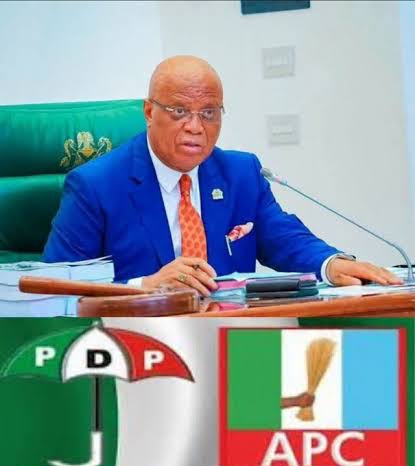By John Junior
As Nigeria gradually shifts its gaze toward the 2027 general elections, political intrigues and realignments are beginning to emerge across the country. At the center of current discourse is the Governor of Akwa Ibom State, Pastor Umo Bassey Eno, whose rumored defection from the Peoples Democratic Party (PDP) has sparked widespread speculation and strategic projections within and beyond the state.
The whispers of an impending defection to the ruling All Progressives Congress (APC) have grown louder, especially following Governor Eno’s public expressions of support for, and cordial engagements with, key figures in the APC—particularly President Bola Ahmed Tinubu and Senate President Godswill Akpabio. No one has denied this. However, those familiar with the governor’s temperament and commitment to issue-based governance understand that these interactions are not acts of betrayal, but rather reflections of political maturity and what the Commissioner for Information, Aniekan Umanah, described as “enlightened state interest.”
In truth, Governor Umo Eno has remained firmly focused on delivering his ARISE Agenda, prioritizing development diplomacy over partisan friction. His inclusive approach reflects the growing need for subnational leaders to collaborate with the federal government for the benefit of their constituents. In this light, his engagements with federal actors and the speculated defection should be viewed through the lenses of pragmatism and realism, not political opportunism.
Since 1999, the PDP has maintained a firm grip on Akwa Ibom State, consistently winning elections and producing strong political leadership. However, at the national level, the party has been beset by internal dissent, fractured leadership, and an absence of ideological cohesion. The cracks became more pronounced after the loss of the presidency in 2015 and have deepened since then culminating in a post-2023 scenario where a factionalized National Working Committee and embedded fifth columnists threaten the party’s future.
In this context, Governor Eno’s political calculations must have considered the PDP’s unstable national posture and its diminishing ability to present a credible opposition or a unifying national narrative. With the party’s influence at the center continuing to wane, its traditional strongholds including Akwa Ibom face the risk of political erosion unless significant reforms are undertaken. One thing is certain in Akwa Ibom: the political calculus has changed and the governor cannot gamble his re- election bid in 2027 with uncertainty. A new political reality has taken shape, one that is not shaped by rigid partisan loyalty but more by political and developmental sagacity and pragmatism.
A recurring theme in Nigeria’s democratic journey has been the informal North-South power rotation agreement, that has helped maintain a delicate balance in Nigeria’s complex federation. Yet, the pattern reveals a troubling inconsistency: southern presidents often face intense resistance when seeking a second term. President Obasanjo, though re-elected in 2003, did so amid fierce political opposition. President Goodluck Jonathan’s second-term bid was ultimately thwarted by northern elite mobilization and resentment, leading to the watershed 2015 election loss. Today, even as President Bola Tinubu settles into his first term, there are early signs of political maneuvering in the North—suggesting a possible replay of history.
Within this dynamic, Governor Umo Eno’s support for President Tinubu and Senate President Akpabio is not only defensible but also strategically astute. It aligns with the imperative to protect the South’s claim to a full presidential cycle and guard against any premature disruption of the zoning balance.
Pastor Umo Eno’s respectful engagement with President Tinubu and Senator Akpabio signals not allegiance-switching, but a recognition of political realities. It reflects loyalty to national unity, regional relevance, and responsible governance. By working with those in power at the center for the benefit of the Akwa Ibom people, Governor Eno affirms that political differences should never hinder developmental progress. His collaborative relationship with Akpabio—once a political rival—demonstrates the bipartisan maturity that today’s leadership demands.
It is in this regard that the recent statement by the Akwa Ibom Unity Forum, a bipartisan coalition of eminent leaders deserve high commendation. Their endorsement of Governor Eno’s national engagements and appeal to President Tinubu to uphold the southern presidency affirms the political consciousness of the Akwa Ibom people. They understand national power dynamics but remain rooted in the state’s unity and developmental interest.
The Forum’s statement also echoed Governor Eno’s longstanding requests to the federal government for intervention in key projects such as the Ibom Deep Seaport and ecological remediation refunds. These calls are timely and vital in a Nigeria that must not only project unity but practice it consistently beyond election cycles. Their support further reinforces a larger commitment to ensuring Akwa Ibom State remains respected, influential, and developmentally prioritized within the national framework.
As political realignments unfold, one thing is clear: Governor Umo Eno is not driven by desperation or distraction. His choices reflect strategic foresight, not the abandonment of principles. In 2027, the South, particularly the South-South must not again be left politically vulnerable.
Rather than criticize his outreach, stakeholders should recognize that Governor Umo Eno is playing the long game rooted in service, anchored in unity, and guided by wisdom. The journey to 2027 has begun, and with Umo Eno at the helm, Akwa Ibom is being carefully and confidently navigated through the evolving political landscape, with both grace and grit.
John Junior is a Public Sector Analyst and writes from Abuja





